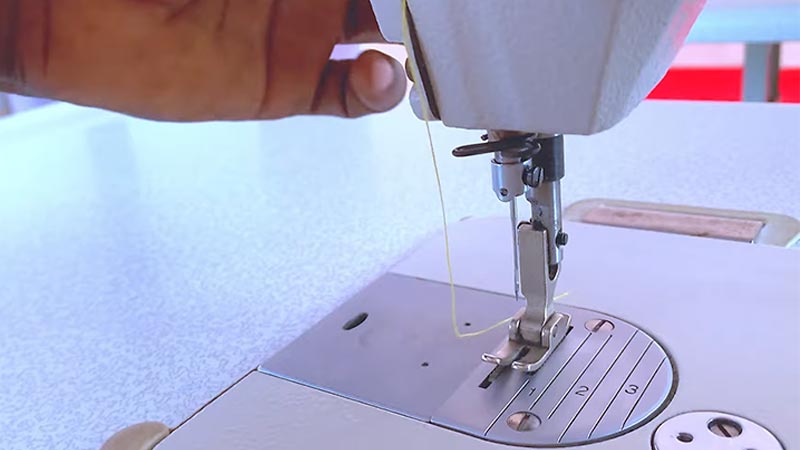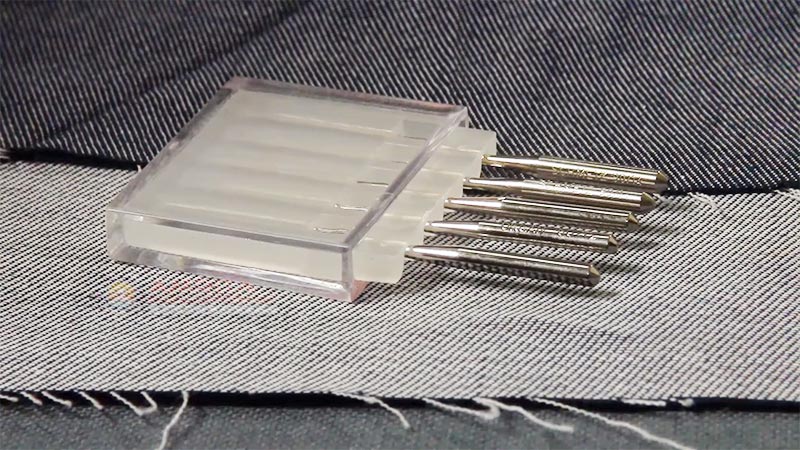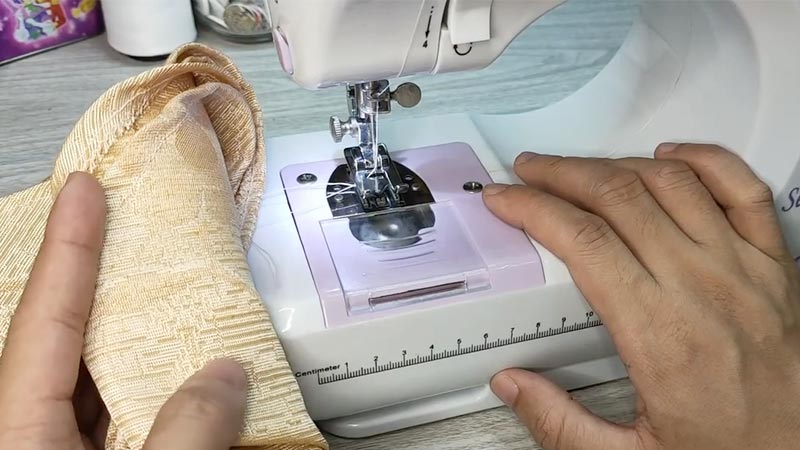Choosing the correct sewing needle size is a fundamental aspect of achieving exceptional sewing results, and this decision becomes even more crucial when working with specific thread sizes.
When dealing with size 69 thread, it’s essential to select the appropriate needle size to ensure smooth stitches and prevent common sewing issues. This introduction explores the ideal needle sizes for size 69 thread, typically falling within the range of 100/16 to 110/18.
These needle sizes are perfectly matched to the thread’s thickness and are tailored for projects involving heavyweight fabrics. The right needle selection enhances the quality of your stitches, prevents thread breakage, and ensures a harmonious sewing experience.

What Size Sewing Needle To Use With 69 Thread?
When working with size 69 thread, it’s advisable to use a sewing needle in the range of 100/16 to 110/18. These needle sizes are well-matched to the thickness of the thread.
Using the right needle size is essential for preventing thread breakage, ensuring smooth stitches, and minimizing sewing issues. It’s also crucial to consider the fabric you’re sewing, as heavier fabrics often require size 69 thread and a larger needle for effective penetration.
Most home sewing machines can handle these needle sizes, making them a practical choice for a wide range of sewing projects. Proper needle selection enhances the overall sewing experience and the quality of your finished products.
Why Is Needle Size Important When Using Size 69 Thread?
Needle size is a critical factor in sewing, and it becomes particularly important when working with specific thread sizes like size 69. The importance of selecting the right needle size when using size 69 thread can be summarized in several key points:
Thread Compatibility
Needle size determines whether the eye of the needle can comfortably accommodate the size 69 thread. Using a needle that’s too small may cause the thread to break or fray, leading to frustrating interruptions in your sewing process.
The right needle size prevents these issues and ensures a smooth flow of thread.
Stitch Quality
Needle size significantly impacts the quality of your stitches. When the needle and thread are appropriately matched, you’re less likely to encounter problems like skipped stitches, tension irregularities, or puckering. This results in neater, more uniform, and professionally finished seams.
Material Penetration
Size 69 thread is often used for heavyweight fabrics. To effectively penetrate these materials, a larger needle size is necessary. Trying to sew through thick fabric with a smaller needle can lead to difficulties and uneven stitching, affecting the overall integrity of the seams.
Preventing Sewing Issues
Using the wrong needle size can result in various sewing issues. If the needle is too small, it may struggle to handle the thickness of the thread, causing thread jams or deflecting the needle. Conversely, an oversized needle can create larger holes in the fabric, potentially weakening it.
Machine Compatibility
Most home sewing machines are designed to work seamlessly with needle sizes in the 100/16 to 110/18 range. By selecting the recommended needle size, you ensure that it is compatible with your sewing machine.
This compatibility minimizes the risk of machine malfunctions or jams, allowing for a smoother and more efficient sewing experience.
What Factors Should You Consider When Selecting a Needle for Size 69 Thread?

Selecting the right needle for your sewing project, particularly when working with size 69 thread, is a crucial step to ensure smooth and successful stitching.
There are several key factors to consider when choosing a needle for size 69 thread:
Thread Size Compatibility
One of the most critical considerations is ensuring that the needle’s size is compatible with the thread. Size 69 thread is relatively thick, and using a needle with an eye that is too small can lead to thread breakage, fraying, or tangling during sewing.
It’s essential to select a needle with an eye large enough to accommodate the thread comfortably.
Material Type
The fabric you’re working with plays a significant role in needle selection. Different materials require specific needle types.
For instance, when sewing heavy fabrics like denim or canvas, commonly associated with size 69 thread, using a larger, stronger needle is recommended to effectively penetrate the material.
Needle Point Type
Needles come in various point types, including universal, ballpoint, sharp, and denim. The point type you choose should match the fabric you’re sewing. Universal needles are versatile for general sewing, while ballpoint needles are suitable for knit fabrics.
Sharp needles work well with woven materials, and denim needles are designed for heavyweight fabrics.
Machine Compatibility
Check your sewing machine’s manual or guidelines for needle recommendations. Some sewing machines may have specific requirements regarding needle size and type. Ensuring compatibility with your machine is crucial for smooth and trouble-free operation.
Nature of the Sewing Project
Consider the specific nature of your sewing project. Different projects may require specialized needles. For example, quilting projects often benefit from quilting needles, while embroidery projects may necessitate the use of embroidery needles.
Needle Brand and Quality
The brand and quality of the needles can significantly impact your sewing experience. Established and reputable needle brands typically offer consistent quality and durability, reducing the risk of needle breakage or other issues during sewing.
Personal Preference
Personal experience and preferences may also come into play. Experienced sewers may have specific needle brands or types they favor based on their past success.
Project Complexity
The complexity of your project can influence needle selection. If your project involves intricate or delicate work, you might opt for a finer needle to ensure precision and detail.
What Happens if I Use the Wrong Needle Size With Size 69 Thread?

Using the wrong needle size with size 69 thread can have significant repercussions on your sewing project. It’s essential to understand the potential issues that can arise when the needle and thread are not properly matched.
Here’s what can happen if you use the wrong needle size with size 69 thread:
Thread Breakage
When the needle’s eye is too small for the thickness of size 69 thread, it can cause the thread to fray, snap, or become entangled during sewing. This leads to frequent interruptions, frustration, and a less efficient sewing process.
Skipped Stitches
A mismatched needle size often results in uneven tension, which can lead to skipped stitches. These gaps in your seams compromise the structural integrity of your project and diminish its overall quality.
Puckering
Using an incorrect needle size may cause the fabric to pucker or gather in unintended areas. This is particularly problematic when working with delicate or lightweight materials, as it affects the visual appeal of your finished work.
Difficulty Penetrating Fabric
An undersized needle may struggle to penetrate the fabric evenly, resulting in irregular stitching and an inconsistent appearance in your seams.
Needle Deflection
If the needle is too small, it may deflect or bend when it encounters resistance from the fabric or thread. This can lead to further sewing problems, potential needle damage, and the need for replacement.
Thread Jams
A mismatched needle and thread combination can lead to thread jams within your sewing machine. These jams disrupt your work and can necessitate time-consuming machine maintenance to resolve.
Weakened Seams
Working with heavy fabrics, like denim or upholstery material, requires a needle of sufficient size to create sturdy seams. Using an inadequately sized needle can create larger holes in the material, potentially compromising the strength and durability of the seams.
Can Any Sewing Machine Handle Needle Sizes Within the 100/16 to 110/18 Range for Size 69 Thread?
Most modern home sewing machines are designed to handle needle sizes within the 100/16 to 110/18 range, which are commonly used for size 69 thread.
These machines are versatile and can accommodate a wide variety of needle sizes to suit different fabric weights and thread thicknesses.
However, it’s always a good practice to check your specific sewing machine’s manual or guidelines to confirm its compatibility with these needle sizes, as there can be variations among different machine models.
Additionally, some specialized or vintage sewing machines may have unique needle size requirements, so it’s important to be aware of any specific recommendations for your particular machine.
FAQs
What size sewing needle is recommended for size 69 thread?
The recommended sewing needle size for size 69 thread typically falls within the range of 100/16 to 110/18. This needle size range is well-suited for handling the thickness of the thread and achieving optimal results.
Can using the wrong needle size with size 69 thread lead to problems?
Yes, using a needle that is too small for size 69 thread can result in thread breakage, fraying, and sewing issues. Conversely, using an oversized needle can create larger holes in the fabric and weaken seams.
Do all sewing machines support needle sizes in the 100/16 to 110/18 range for size 69 thread?
Most modern home sewing machines are designed to handle needle sizes within the 100/16 to 110/18 range, making them versatile for various sewing projects. However, it’s advisable to check your specific machine’s manual to ensure compatibility.
Are there specialized needles recommended for specific projects using size 69 thread?
Yes, the nature of your sewing project may require specialized needles. For instance, quilting or embroidery projects often benefit from specific needle types to achieve the best results.
What is the impact of needle size on stitch quality when using size 69 thread?
Needle size significantly affects stitch quality by regulating thread tension, preventing skip stitches, reducing puckering, ensuring uniformity, preventing thread breakage, and promoting smooth fabric penetration, resulting in professional-looking seams.
To Recap
Selecting the right sewing needle size when working with size 69 thread is a critical element of sewing success. The recommended range of 100/16 to 110/18 needles ensures optimal compatibility, preventing thread issues, and achieving smooth stitches.
This choice plays a vital role in stitch quality, fabric penetration, and overall sewing project performance, especially when dealing with heavy materials.
By adhering to these needle size guidelines, you can enhance the quality and professionalism of your sewing projects while minimizing common sewing complications.
Ultimately, the right needle size for size 69 thread ensures that your sewing machine operates efficiently, contributing to a smoother and more satisfying sewing experience, and resulting in beautifully finished products.
Leave a Reply